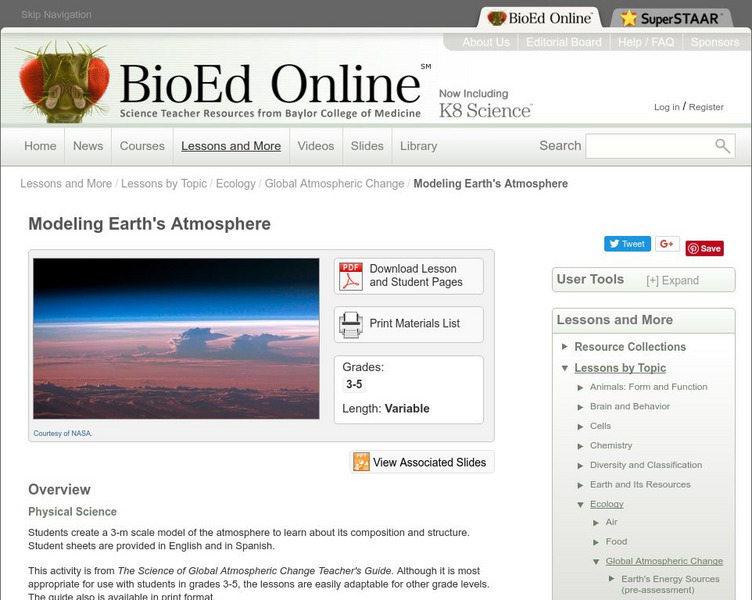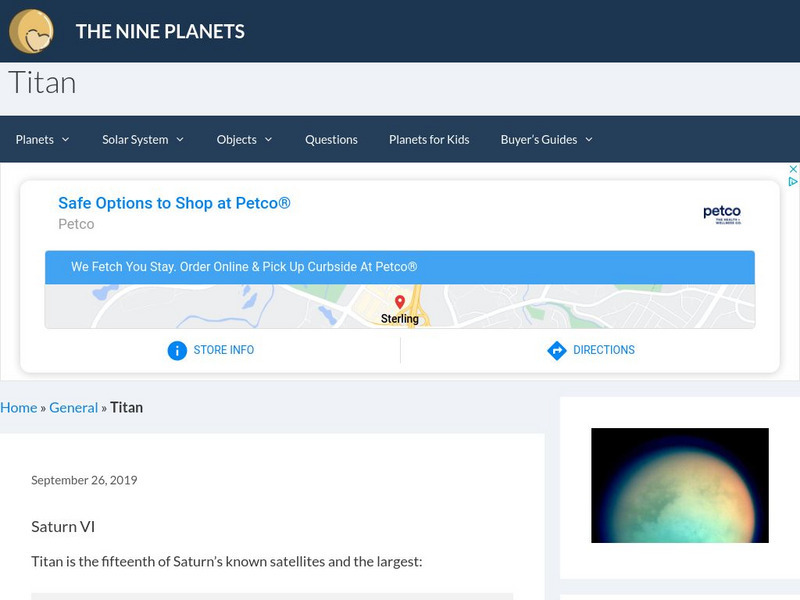Hi, what do you want to do?
Curated OER
Science: Trouble in the Troposphere
Students research a NASA Website and record information about an assigned city's tropospheric ozone residual monthly climate. In groups, they graph the information for the past year. They form new groups and compare their city's...
Curated OER
Stellar Lunar Curriculum
Learners engage in a instructional activity about the moon and three different constellations. They conduct research using a variety of resources. The teacher leads the class with demonstrations and discussion groups. The research is...
Curated OER
Sea Surface Temperature Trends of the Gulf Stream
Young scholars use authentic satellite data to produce plots and graphs of sea surface temperature as they explore the seasonal changes of the Gulf Stream.
Curated OER
Natural Hazards
Young scholars evaluate the hazards of naturally occurring events. After watching a video concerning safety hazards, students work in groups to discuss the safety issues involved in taking a trip to a mountainous region. ...
Curated OER
Sea Surface Temperature Trends of the Gulf Stream
Young scholars explore the importance of the Gulf Stream. Using a NASA satellite images, they examine the sea surface temperature. Students collect the temperature at various locations and times. Using spreadsheet technology, they graph...
Curated OER
Wave Types and Characteristics
Ninth graders identify the different parts of a wave. In this physics lesson, 9th graders observe wave behavior as it travels through a boundary. They determine the relationship between wavelength, frequency and velocity.
Curated OER
Taking Risks: Drug and Alcohol Abuse
Students discuss a video about drug and alcohol abuse and their connection to risk-taking. They answer questions on a risk factor sheet about the use of tobacco, drugs, and alcohol. They discuss long and short term goals and how not...
Curated OER
Using My Nasa Data To Determine Volcanic Activity
Students use NASA satellite data of optical depth as a tool to determine volcanic activity on Reunion Island during 2000-2001. They access the data and utilize Excel to create a graph that has optical depth as a function of time for the...
Curated OER
Cloud Types and Formation of Clouds
Students take cloud and weather related photographs during the year, making certain to make notes of when, where and what time the photograph was taken. At some point all the pictures be gathered and a scrapbook or "cloud library" be made.
Curated OER
Is There Really Life on Mars?
Learners examine the work of scientists and determine how they test their theories.
Curated OER
Surface Water Supplies And The Texas Settlements
Learners engage in a lesson that is concerned with the allocation and finding of water resources. The location of different settlement areas is considered as one looks how the water is distributed. They map some of the early Spanish and...
Curated OER
On the Surface
Students draw and label the 15 major rivers in Texas. They then draw and label another map with the major lakes and reservioirs of Texas. Students use the maps and locate and label the location of the following major Texas cities:...
Curated OER
Building an Ecologically Balanced Living Space
Students design and build an ecologically balanced living space based on the principles of an old growth forest. They take one part of a house (or structure in the community) and redesign it according to the principles of the forest cycle.
Curated OER
Tracking the Weather Using Technology
Fourth graders explore the use of technology to monitor and forecast weather. They investigate the different types of weather monitoring and forecast tools. Students interpret radar images and discuss the traditional types of weather...
BioEd Online
Bio Ed Online: Modeling Earth's Atmosphere
Students learn about the composition and structure of the atmosphere and create a large model of it. The lesson and accompanying PowerPoint can both be downloaded, and the student handout is provided in both English and Spanish.
National Geographic
National Geographic: Interactions Within Earth's Atmospheres
Using computational models, students investigate the interaction between greenhouse gases, solar radiation, and the Earth's surface for the impact on climate. They then look at data on atmospheric carbon dioxide to analyze changes in...
South Carolina Educational Television
Know It All: The Properties of the Atmosphere
In this lesson, 6th graders will develop and use models to exemplify the properties of the atmosphere and the relative scale in relation to the size of Earth.
Other
Gfdl: Temperature (F) Response Due to Increased Atmospheric Co2
An animated model of the Earth from the Geophysical Fluid Dynamics Laboratory showing how global temperatures increased from 1870 to 2100 due to rising amounts of carbon dioxide in the atmosphere.
National Association of Geoscience Teachers
Nagt: Earth System Science Project
An Earth System Project shows the interaction between the Geosphere, Hydrosphere, Atmosphere, and Biosphere. This project provides a model of a pond ecosystem and can easily be woven into the hydrosphere unit.
The Wonder of Science
The Wonder of Science: 5 Ess2 1: Earth Sphere Interactions
Fifth graders develop a model using an example to describe ways the geosphere, biosphere, hydrosphere, and/or atmosphere interact.
NOAA
Noaa: Structure of the Earth [Pdf]
Create a model to help learn the layers and structures within the Earth. Identify characteristics of each layer of the Earth.
American Geosciences Institute
American Geosciences Institute: Earth Science Week: Chemistry of Burning
In this activity, students use pipe cleaners and foam balls to build a model of a hydrocarbon molecule. They then modify it to demonstrate the chemical reaction that happens when the hydrocarbon is burned.
Nine Planets
The Nine Planets: Titan
This site from The Eight Planets shows that Titan may serve as a model of a highly reduced early Earth atmosphere in which the first stages of organic chemical evolution could take place in the atmosphere.
Concord Consortium
Concord Consortium: Stem Resources: Greenhouse Gases
Do you understand the relationship between temperature and carbon dioxide in our atmosphere? This computer model shows factors such as clouds and carbon dioxide that could cause global temperatures to rise. Students investigate how the...

























